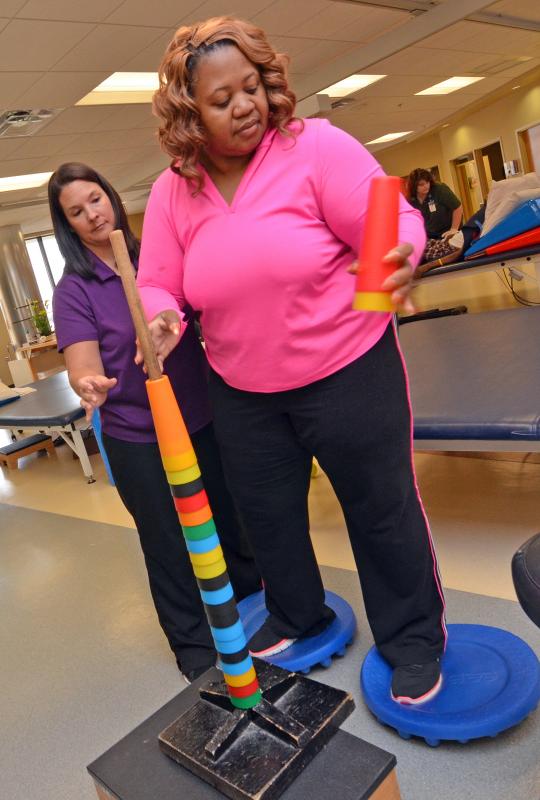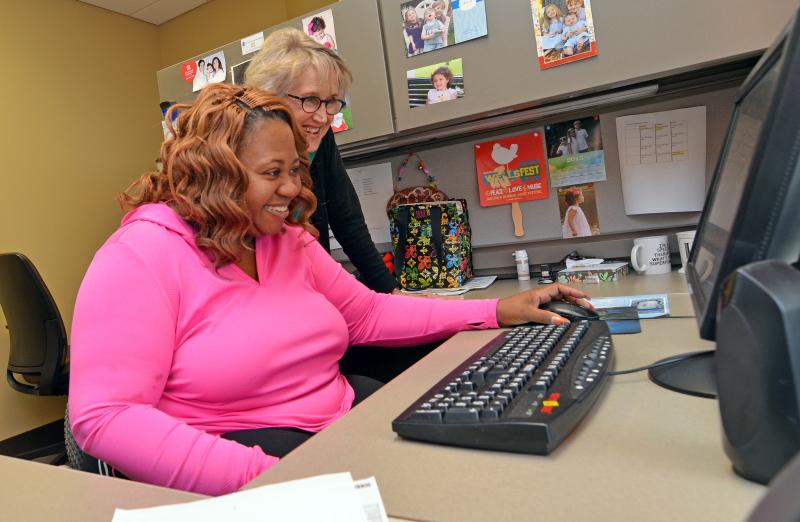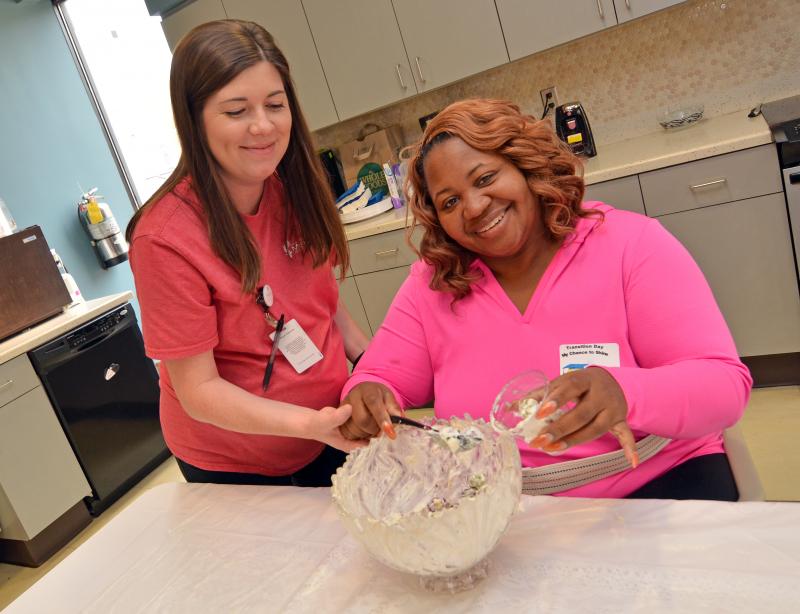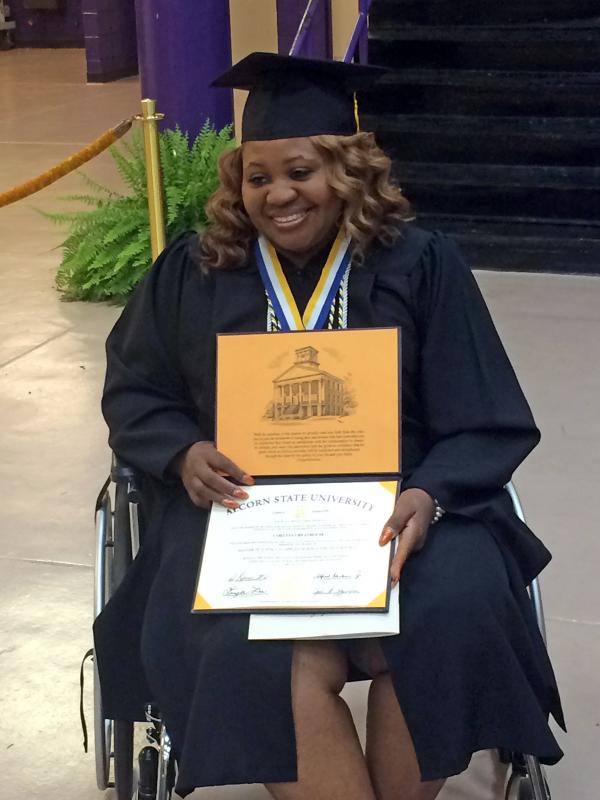The slow grind of graduate school was over.
After two years of study, Coretta Greathouse of Vicksburg had finally earned her master’s degree in applied science and technology management and was looking forward to commencement ceremonies at Alcorn State University in Lorman.
But 15 days before graduation, the 47-year-old fell victim to a disabling stroke.
“I couldn’t walk. I couldn’t talk. I couldn’t do anything,” she said.
Still, her fiancé Stanley Tillman knew Greathouse would hate to miss her big day. So when she began stroke therapy at Methodist Rehabilitation Center in Jackson, he made her wishes known.
“I said the one request I have is she be allowed to attend her graduation,” Tillman said. And Greathouse’s stroke doctor said he saw some therapeutic benefit to that proposal.
“What we do in rehab is help people meet their goals,” said Dr. Thomas Sturdavant. “And in her case, going to the graduation was a motivating factor in therapy. It’s what made her do as well as she did.”
“Since the first moment I got to Methodist I worked hard, and I saw that I was improving,” she said. “It started off very difficult, but every day or so it got better. They don’t let you quit.”
During initial sessions with Methodist physical therapist Leslie Taylor, Greathouse mainly focused on strengthening her weakened right arm and leg.
“When she first came she could only walk 5 to 8 feet with a rolling walker, but she really progressed,” Taylor said. “Before she was discharged, she was walking 200 to 600 feet using a rolling walker with supervision. And I had started doing gait training with a quad cane and working on higher level balance activities. We were trying to fine-tune her abilities to get her to her previous level.”
Methodist occupational therapist Adrienne Brumfield also focused on activities to help Greathouse become more autonomous.
“She had good hand movement, but her right shoulder movement was weak,” Brumfield said. “We worked on strength and coordination so she could be more independent. She loves to cook, so we worked on making sure she was safe going home.”
A caterer on the side, Greathouse showed off her returning skills by preparing a meal in Methodist’s fourth floor kitchen. “She had this kitchen smelling good,” Taylor said. “And everything looked so pretty, it was like she was a chef.”
In speech therapy, Greathouse spent time improving her thinking and language skills.
“She had some imprecise consonants, and we worked on strategies to improve her intelligibility,” said speech pathologist Kathleene Shapley. “Speech-wise, I don’t think when we first started that she recognized her errors. She had to get aware so we could correct them.”
Greathouse also worked on memory and problem solving in anticipation of reclaiming her analyst support position at International Paper Co. in Redwood.
Greathouse was at her workplace when her stroke symptoms began on April 21, and she remembers feeling confused.
“I tried to send some emails, and I was having trouble thinking,” she said. “They didn’t make any sense. Everybody who saw the emails said they thought: What’s wrong with Coretta?”
Fortunately, Greathouse had the presence of mind to summon the company nurse, Khelli Lockridge.
“She said: ‘Let me check you out,’ and nothing seemed right,” Greathouse said. “She put me in an ambulance and took me to Vicksburg.”
Lack of a neurologist at the Vicksburg hospital meant Greathouse needed a transfer. By the time she was examined at a Jackson hospital, “her speech was slurred, and she was weak on her right side,” said Tillman.
The symptoms were classic signs of a stroke, but a CT scan didn’t support the diagnosis. So when Greathouse seemed normal about two hours later, she was sent home with an appointment for a follow-up neurology visit.
As Greathouse and Tillman stopped for food on the way home, her speech became garbled again. This time, she was admitted to the hospital and an MRI scan verified a stroke.
Considering she’s only in her 40s, Greathouse seemed an unlikely candidate for a stroke. The vast majority occur after age 65. But the American Heart Association has noted an uptick in strokes among young people. From 2000 to 2010, hospitalization rates increased 43.8 percent in people age 25 to 44 and 4.7 percent in those 45 to 64.
In the youngest patients, strokes are often linked to congenital heart problems. But many young adults share the same risk factors as older stroke victims—such as diabetes and high blood pressure.
Greathouse has hypertension, and it was a likely contributor to her stroke. But the bigger culprit may have been extreme stress.
“Stress can raise your blood pressure,” Dr. Sturdavant said. “And she was working full-time and trying to get her master’s, which can be a tad tough.”
Noticing her struggles, Alcorn associate professor Dr. Steve Adzanu tried to help.
“I told her she needed to slow down,” Adzanu said. “If things were not done in a timely manner or didn’t get done in the way she wanted them done, she would stress herself out.”
To make sure Greathouse didn’t get that way about her graduation plans, Methodist staff stepped in to make arrangements for her arrival at Alcorn.
Methodist nurse manager Susan Taylor worked with Alcorn staff to coordinate accommodations for Greathouse. And when it was time to receive her degree, Greathouse rolled up in her wheelchair to audience applause.
Among those cheering her on was Dr. Jermiah Kiran Billa, an assistant professor in the Department of Advanced Technologies.
“When I heard about her having a stroke, I was very concerned that she might miss her graduation,” he said. “I was so happy when I received an e-mail from Susan Taylor about the assistance they planned on providing Ms. Greathouse.”
Greathouse said she’s grateful to everyone involved in getting her to Lorman. “It meant a lot to me,” she said. “I got to accomplish a major dream.”
And she’s especially thankful to her fiancée, for his chauffeuring duties and more.
“I don’t know what I would have done without him,” she said. “He has done more for me than I can say.”
Greathouse left Methodist Rehab on May 12. And she plans to continue therapy at a clinic closer to home as she readies for a return to work.
“I want to be able to go back to where I was and perform better,” she said.
But she says she doesn’t intend to repeat her Type A tendencies.
“I’m not going to worry about anything from now on,” she said. “I will take one day at a time and handle one problem at a time and go from there.”




